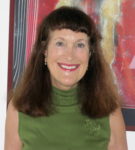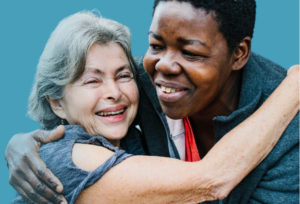By Mimi Pollack


LA MESA, California — Many of us who have worked extensively with immigrants and refugees are worried about what the next four years will bring. I also believe that each one of us can do small acts of kindness or find our own ways to combat these unsettling times. One of those ways for me is by highlighting a worthy volunteer each month in 2025 to showcase people doing good work. In January, it was Janna Leoff and her work with the Helen Woodward Center. Ruth Kaplan is the volunteer I will be writing about for February. She has gone above and beyond helping newly arrived immigrants and refugees.
I first met Kaplan in 2018 at the downtown Greyhound Bus Station. We were both there at night assisting refugees that were being dropped off by Border Patrol and Jewish Family Service Rapid Response Shelter volunteers. These were people who had been processed, approved for travel, and wore ankle bracelets. They were on their way to meet up with family members or sponsors in other parts of the United States. We assisted them in buying their tickets and provided water, snacks, and toiletries for them until they reached their final destination. We helped people from many different countries who were fleeing bad situations. I was impressed by Kaplan’s kindness and dedication, and we have stayed in touch ever since although we stopped going to the bus station during the pandemic and pivoted to other ways to help, such as gathering donations, etcetera.
I met with Kaplan last week and asked her the following questions.
1] I met you in 2018 at the downtown bus station. When did you begin doing volunteer work with immigrants/refugees? Which agency did you work with first and what did you do?
Soon after retiring, I became a Jewish Family Service volunteer in 2017 after they helped organize an urgent Jewish community gathering to protest the “Muslim Ban” and to highlight volunteer opportunities in support of arriving refugees. When LAX reopened to Muslim refugees, I called JFS to offer bedrooms and the next day received a wonderful young Hazara couple from Afghanistan with a nine-month-old baby. They stayed with me a few days while JFS prepared their new apartment.
The family and I also joined JFS’ Friendly Match program. In the early years, I helped the mom enroll successfully in a GED prep program and got to entertain the little boy while the mom was able to catch up on dental care. We have become close friends, and now I get to be the local grandma to the boy who is a happy second grader. The mother has just received her bachelor’s degree from SDSU and is looking forward to a career in social work. The father works to support the family while enjoying his role as a super dad.
2] Which different agencies have you worked with? Who do you volunteer with currently?
I continue to work with Jewish Family Service, and I have also worked with Rapid Response and Catholic Charities.
3] Tell me a little about you and why you became a volunteer. Is there another family you would like to highlight?
I grew up knowing my father’s family’s experience as Jewish immigrants from Belarus in the early 1900’s and my mother’s grandma’s experience as a 13-year-old stow-away orphaned by the pogroms in the 1890’s. I have always welcomed opportunities to advocate for immigrant rights.
In 2009, the Obama administration encouraged the formation of grassroots advocacy groups. I co-led such a group supporting the Dreamers’ campaign for the Dream Act. When DACA became a reality, I informally mentored two Dreamers and helped with their DACA applications in 2012. I am still in touch with both and have seen how DACA has transformed their lives and their contributions to our communities.
In 2018, I became a volunteer with the Rapid Response Network and became a very active volunteer with the Asylum Shelter which Jewish Family Services co-managed. Each week from November 2018 until March 2020, I accompanied families to the airport, bus station, and to medical appointments. Most of the shelter guests travelled on to family in other cities and states. In addition, JFS provided much support for the few families who arrived without contacts in the US.
I became closely involved with such a family. They are Venezuelan citizens of Haitian descent. The family had experienced discrimination in government food distribution and were facing starvation in Venezuela. The youngest of the three children is severely cognitively disabled and arrived at age 7 having had no opportunity to receive education or services in Caracas. As a single mother, Emanise bravely fled Venezuela with her 7, 9- and 11-year-old children when she could no longer feed her children. Together with another family, she walked through the notorious Darien Gap, carrying her disabled child much of the way through mountain passes and overflowing rivers. Because of the 7-year-old son’s severe disability, in June of 2019, the family was given priority in being processed and were released at the San Ysidro port of entry. They were released without any guidance. Thankfully, a JFS volunteer found them and took them to the shelter.
With guidance from JFS, I helped the family navigate much needed medical services at Rady’s. I became a Catholic Charities volunteer when JFS transferred the family’s case management to Catholic Charities.
I helped the children in school and registered them for medical care at Family Health Centers. When the family was given several months to find stable housing, we formed a support group at Temple Solel and partnered with members of The Catholic Worker to raise funds for their first year’s rent. Members of the Solel group also helped the family apply for In-Home Supportive Services and for Autism Behavioral Therapy services.
The older daughters are now successful students at UCSD’s Preuss School where they are preparing to go on to college and the boy has made great progress thanks to having received after-school at-home behavioral therapy since early 2020.
Emanise had grown up in rural Haiti and did not have the opportunity to finish school. But she was determined that her daughters have every opportunity to do so. She now is proudly studying English and has successfully completed several levels of ESL.
In my ongoing role as a JFS volunteer, I was able to obtain food donations from JFS during the pandemic. These days, I still accompany the mom to JFS’s wonderful Turk Family Center Corner Market where she can stock up on fresh produce and other healthy foods. Thanks to the Corner Market and income from the In-Home Supportive Services program, they no longer worry about lack of food.
5] Tell me a little about you. What type of work did you do?
I worked for many years in a wide variety of public service work involving financial and data analysis as well as human services.
For the last 18 years of my career. I worked with Community Clinics and Medi-Cal health plans to help families regain lost Medi-Cal coverage. I was able to create data extracts that identified the likely cause of each family’s problems. At times, I had the opportunity to give input to State and County governments to help prevent avoidable loss of coverage.
I always knew that I would want to become a volunteer after retirement and am so grateful for the opportunities I have had to do so.
Ruth Kaplan has definitely made a difference in the lives of others in her Tikkun Olam journey.
*
Mimi Pollack is a freelance writer based in La Mesa, California
Hi, Mimi,
Thanks for this article and for your commitment to featuring a new volunteer each month. It was interesting to me how the Haitian family moved from JF services to Catholic Charities and Ruth followed them.
What a dedicated woman!
Virginia
Ruth is definitely a great example of Tikkun Alom! Thanks for bringing her story to light, Mimi!
Wow! Great story about a wonderful human being. This is uplifting compared to the news. Thanks.
What a magnificent contribution Ruth makes, not merely to the people she’s helped, but to our greater San Diego community, because she’s helping people contribute to our society sooner and more expansively than they could’ve without her. Her faith in and devotion to immigrants is a beautiful thing, which some in our country just don’t seem to have the heart or maturity to understand or value. Ruth, thank you! And thank you Mimi for highlighting her.